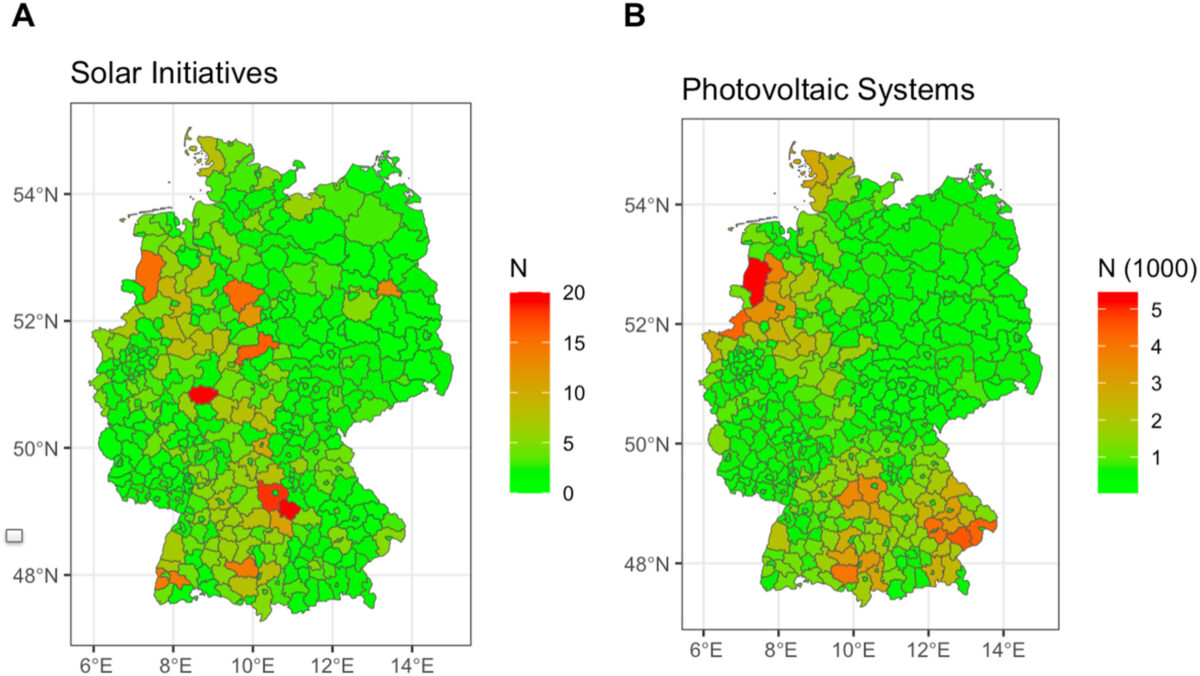Legitimation, competition drive citizen-led PV initiatives in Germany – pv magazine International
Scientists have analyzed what factors affect the emergence of solar associations and cooperatives in Germany. Applying the organizational ecology theory, they found a collective solar initiative in a given district may likely lead to creation of similar experiences in the same district.
April 4, 2024
Researchers led by the Technical University of Darmstadt sought to identify what forces influence the likelihood of citizen-led solar initiatives to emerge in Germany. By solar initiatives, they are referring to associations and cooperatives deploying collective PV projects.
“Solar initiatives and other organizations, such as for-profit, represent different organizational species and are likely to occupy distinct niches,” the scientists explained. “Private for-profit investors usually seek to maximize the economic return on their investments. Conversely, citizen-led initiatives and cooperatives are known to engage in economic activities without focusing on economic gains as their sole or primary goal.”
The group based its analysis on the organizational ecology theory, which is a theory in sociology that examines the dynamics of organizations within their specific social and natural environments.
According to this theory, the emergence of different organizational species is partly governed by the interaction between legitimacy and competition. While the former refers to the influence of social or institutional legitimacy on the organization, the latter refers to the competition between organizations. “In the case of citizen engagement in photovoltaics, scarcity can be experienced, for example, in the search for members or in the availability of suitable rooftop spaces for installations,” the research group said.
For their work, the scientists utilized organizational ecology theory with spatial analyses. They used data about citizen-led solar initiatives in Germany from 2006 to 2018, where they found 268 associations and 804 cooperatives operating PV systems. They focused on medium systems of 20 kW to 100 kW, usually placed on the rooftops of commercial and public buildings.
“To test our hypotheses on the legitimacy or competitive effects of the density of photovoltaic systems on the emergence of solar initiatives, we collect data on photovoltaic systems from the market master data register (Marktstammdatenregister) and derive the aggregated number of plants installed per quarter at the district level,” they explained. “Units of solar initiatives in our sample account for 0.46% of the total number of installed small- and medium-scale photovoltaic systems in Germany.”
Popular content
According to their findings, legitimacy effects emanate from existing solar initiatives. They found a positive correlation between the emergence of solar initiatives in a district and the density of existing solar initiatives in the same district. However, they have also found that the density of medium photovoltaic installations has a negative impact on the likelihood of establishing a solar initiative.
“Our study therefore provides no evidence in favor of the technological relatedness argument,” they added. “Rather, we find that solar initiatives emerge, where the installation rate of a certain type of photovoltaic system lags, namely medium-scale photovoltaic systems. These results indicate that the neighborhood and peer effects reported in the literature on residential photovoltaic systems do not drive the emergence of solar initiatives. Rather, it appears that spatial constraints regarding available roof space are a major limiting factor for citizen engagement.”
Concluding their article, the scientists said that neither “first come, first serve” nor “the more, the merrier” are suitable analogies for the situation in Germany, but rather “let’s do it ourselves” activism. “This thought is consistent with citizens acting out of a sense of need and urgency rather than simply copying what others have already done,” they explained.
Their findings were presented in “‘First come, first served’ or ‘the more, the merrier’? Organizational dynamics of citizen-led solar initiatives and the presence of photovoltaic installations in Germany,” published in the Journal of Cleaner Production. The research team included academics from Leuphana University Lueneburg and Norway’s Western Norway University of Applied Sciences.
This content is protected by copyright and may not be reused. If you want to cooperate with us and would like to reuse some of our content, please contact: ed*****@pv*********.com.


